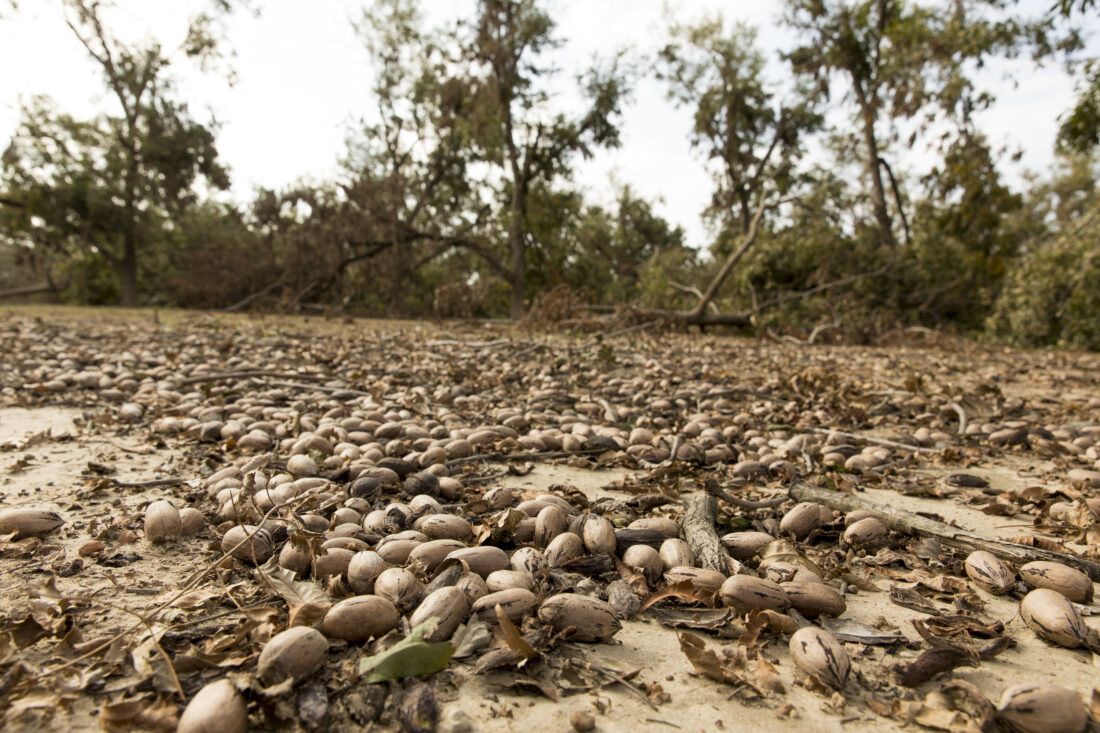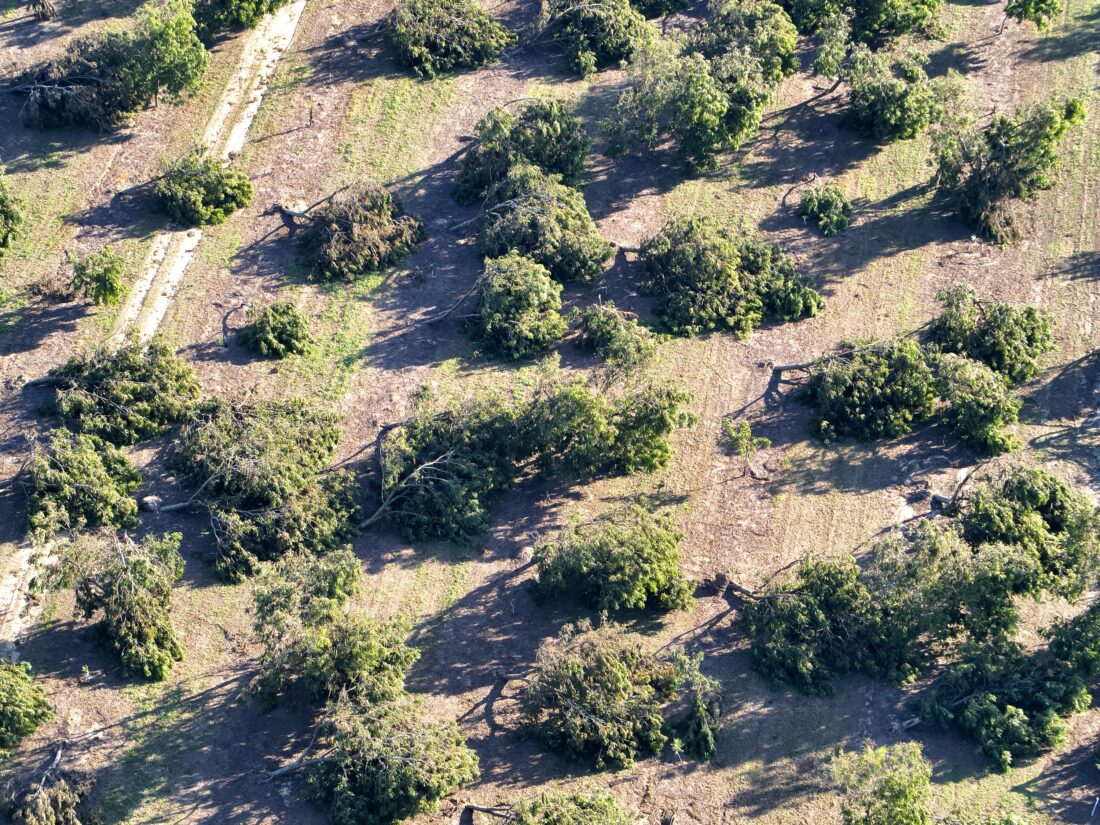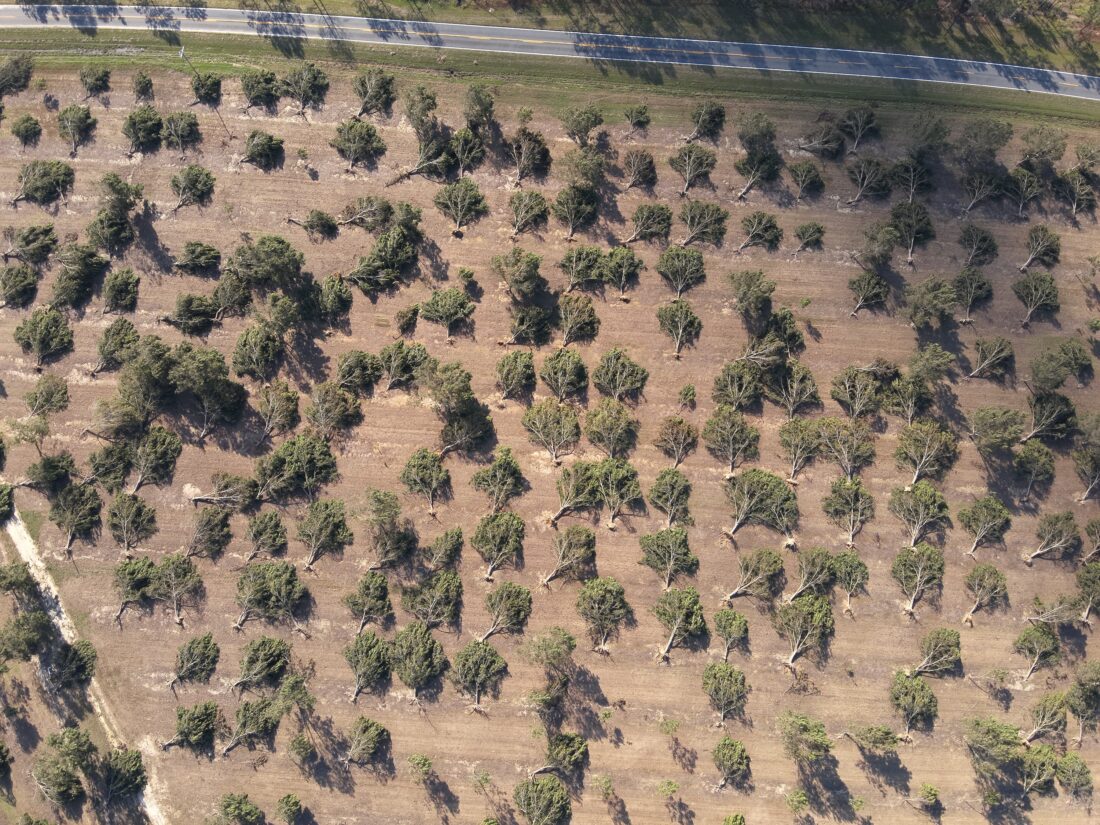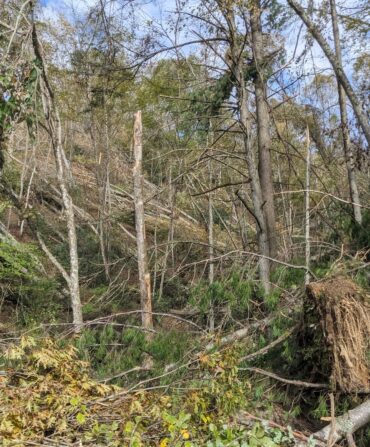Thursday was like any other humid September day at the Stuckey family orchard in Eastman, Georgia. Rain drizzled on the pecan leaves, a slight breeze drifted through the branches, and then Helene, a fierce storm about to batter Florida’s Big Bend, shifted ever so slightly eastward.
“It didn’t look like it was going to hit that region of Middle Georgia,” says Stephanie Stuckey, the chair of Stuckey’s Corporation, which is known for their roadside pecan treats. “We really weren’t prepared.” Although the wind only claimed a few of their trees, the nuts were a different story. All across the farm, nearly full-sized pecans plummeted to the soggy ground.
The Stuckey’s pecan orchard in Middle Georgia was hit hard by #hurricanehelene (this was taken in happier and drier times). This land has been farmed by my family for almost 100 years; we’ll replant and rise again. Pray for Georgia’s pecan farmers, many of us are suffering today. pic.twitter.com/nBoD0AjzMg
— Stephanie Stuckey (@StuckeyStop) September 27, 2024
Stuckey’s is just one of many pecan farms across Georgia, where a third of all pecans in the country grow. “Most of it is grown in that South Georgia area that was hit,” Stuckey says.
While gusts of over fifty miles per hour were testing Stuckey’s trees, wind speeds double that battered the southern part of the state. “East of I-75, from Valdosta all the way to Augusta and everything east of that line, it’s horrific,” says Lenny Wells, a professor of horticulture who studies pecans at the University of Georgia.
In 2018, Georgia lost its title as the biggest pecan producer in the U.S. when production was cut almost in half after Hurricane Michael. “Until now, I honestly never thought I would see anything worse than Michael,” Wells says. “It’s still early, but I would say, by far, this is the worst I’ve seen, and it’s over a much wider area than we’re used to seeing, too.”
Pecans aren’t the only important crop in southern Georgia’s fertile coastal plain, which is also known for peanuts, blueberries, and peaches, but it’s one of the most vulnerable to hurricanes and tropical storms. Alongside cotton, the bulk of Georgia’s pecans are harvested in fall, so most of the nuts hadn’t been collected ahead of Helene. The growing nuts put a lot of strain on the tree, allowing the wind to easily snap the heavy branches. “Those nuts are on the ground, along with debris and a foot of rain,” Stuckey says. “They’re rotting…this year’s crop is gone.”

At this point, it’s too early to assess the economic damage of Helene on Georgia’s pecan farms, Wells says. But he guesses that around a quarter of pecan-producing land in the state was affected. “The farmers are just trying to get stuff off their houses, get their power back, get communications back,” he says. “A lot of them had to cut their way out of their houses and driveways to even check on their orchards.”
Georgia is no stranger to hurricanes and storm damage, but with Helene as evidence, Stuckey is concerned for the future as these storms become more intense in a changing climate. “This stuff is real. People want to debate what’s causing it, and that’s up to them, but you can’t debate that it’s happening. They’re just getting worse, and they’re occurring more frequently,” says Stuckey, who previously served as the director of sustainability for the City of Atlanta.
And there’s only so much farmers can do to prepare. Practices like pruning can reduce the amount of wind resistance on a pecan tree, but “when you get ninety-mile-an-hour winds on top of six or seven inches of rain, that’s not going to always eliminate the problem,” Wells says.

The Stuckey family farm is far from the most damaged, but even for them, production will suffer. “It wasn’t just the grove, it was our candy plant—we’re out of power for a week,” Stuckey says. “We’re behind in production now at our busiest time of year. It’s harvest season, and it’s the holidays. It’s when people start baking. They want their pecans.”
The Georgia Grown–certified business will also feel the pinch from partner farms, whose harvests typically supplement their own to make iconic products like their pecan log roll. “We really take pride in sourcing our nuts from local farmers,” Stuckey says. “But we may need to source some nuts from another state.”
Whether that will have to be a solution beyond this season remains to be seen. The fate of many Georgia pecan farms is uncertain; farmers have dealt with storm after storm, Wells says, and Helene in particular caused “life-altering” damage. But both Stuckey and Wells say it’s a tight-knit, tenacious community. “I think farmers are among the most resilient people there are,” Stuckey says. “Pecan farmers all know one another. They all work together. They all support one another. Sometimes we compete a little bit on selling our products, but ultimately, we’re all on team pecan.”








